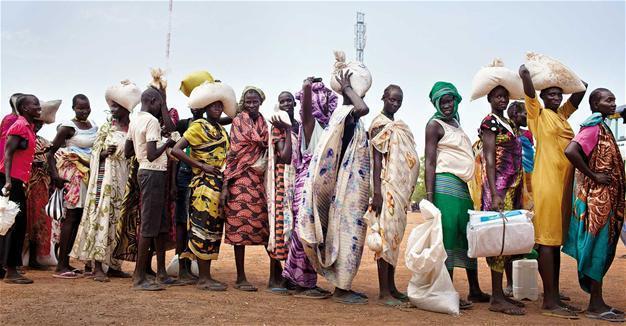South Sudan suffering ‘man-made’ famine
JUBA
 South Sudan on Feb. 20 declared famine in some parts of the country, with more than three years of war leaving nearly five million hungry in what aid groups called a “man-made” tragedy.
South Sudan on Feb. 20 declared famine in some parts of the country, with more than three years of war leaving nearly five million hungry in what aid groups called a “man-made” tragedy.Isaiah Chol Aruai, chairman of South Sudan’s National Bureau of Statistics, said some parts of the northern Greater Unity region “are classified in famine, or... risk of famine.”
Aid agencies said 100,000 people were affected by the famine, which threatened another one million people in the coming months.
“A formal famine declaration means people have already started dying of hunger. The situation is the worst hunger catastrophe since fighting erupted more than three years ago,” said the statement by the World Food Programme (WFP), U.N. children’s agency UNICEF and the Food and Agricultural Organisation (FAO).
South Sudan, the world’s youngest nation, was engulfed by civil war in 2013 after President Salva Kiir accused his rival and former deputy Riek Machar of plotting a coup against him.
An August 2015 peace deal was left in tatters when fighting broke out in Juba in July last year.
Violence - initially between ethnic Dinka supporters of Kiir and ethnic Nuer supporters of Machar - has since spread to other parts of the country, engulfing other ethnic groups and grievances.
The United Nations has warned of potential genocide and ethnic cleansing and there is no prospect of peace in sight.
Oil-rich Unity State, a traditional Nuer homeland and Machar’s birthplace, has been one of the flashpoints in the conflict and has flipped several times between government and rebel forces.
“The convergence of evidence shows that the long-term effects of the conflict coupled with high food prices, economic crisis, low agricultural production and depleted livelihood options” have resulted in 4.9 million people going hungry, Aruai said.
That figure represents 42 percent of the country’s population.
The famine classification is according to an internationally recognized sliding scale of hunger in which an extreme lack of food has led to starvation and death.
“The main tragedy of the report that has been launched today... is that the problem is man-made,” said Eugene Owusu, the United Nation’s Humanitarian Coordinator for South Sudan.
“The underlining drivers have been there for some time and we have all known that we have a major food crisis.”
He said conflict and insecurity for humanitarian workers, who had suffered attacks while carrying out their work, and the looting of “humanitarian assets” had exacerbated the crisis.
In September last year, several aid agencies had to pull out of the famine-hit area of Leer because of escalating fighting between the two forces.
“I would like to use this opportunity to call on the government, the warring parties and all actors to support humanitarians to provide the necessary access so we can continue to bring lifesaving services to those in need,” Owusu said.
















